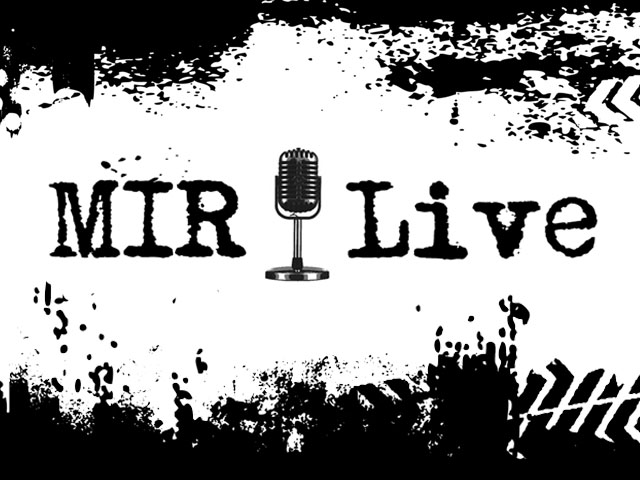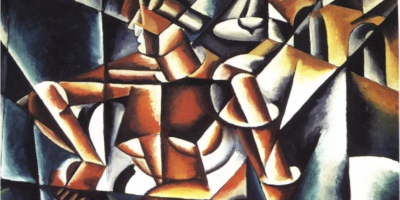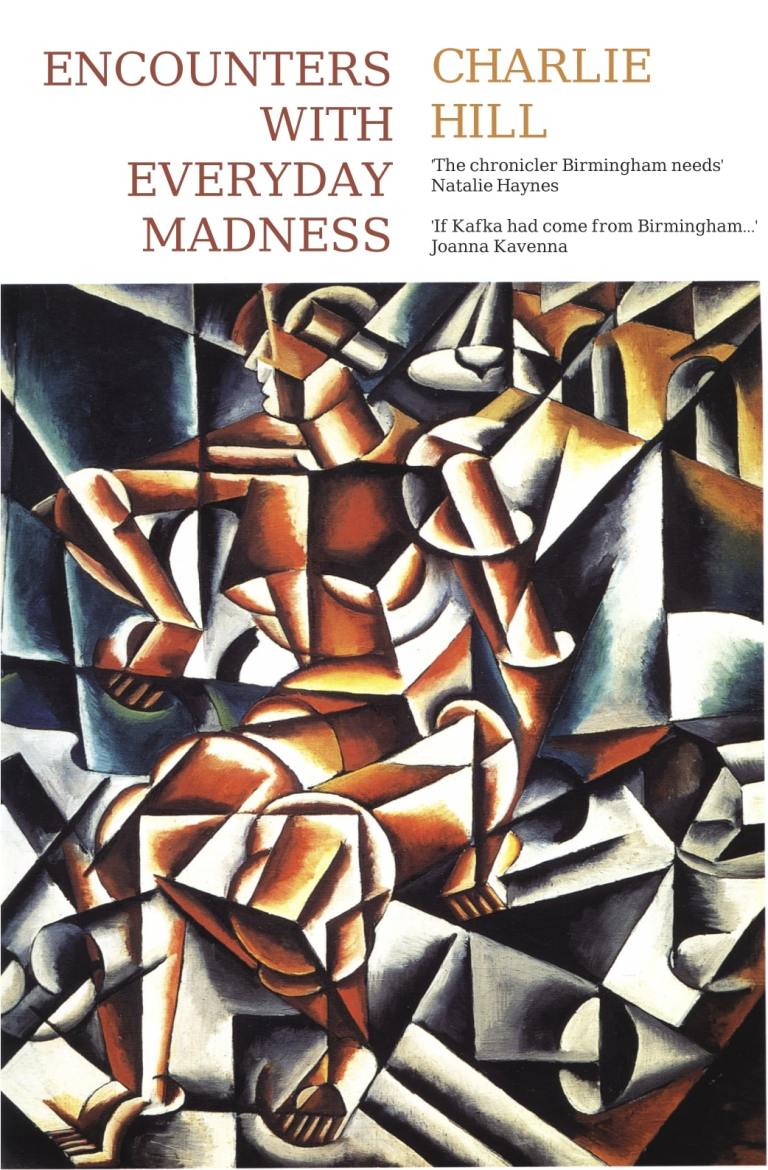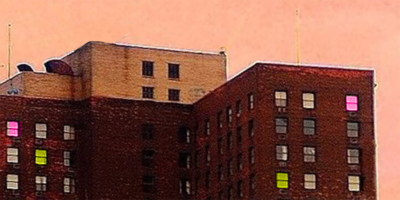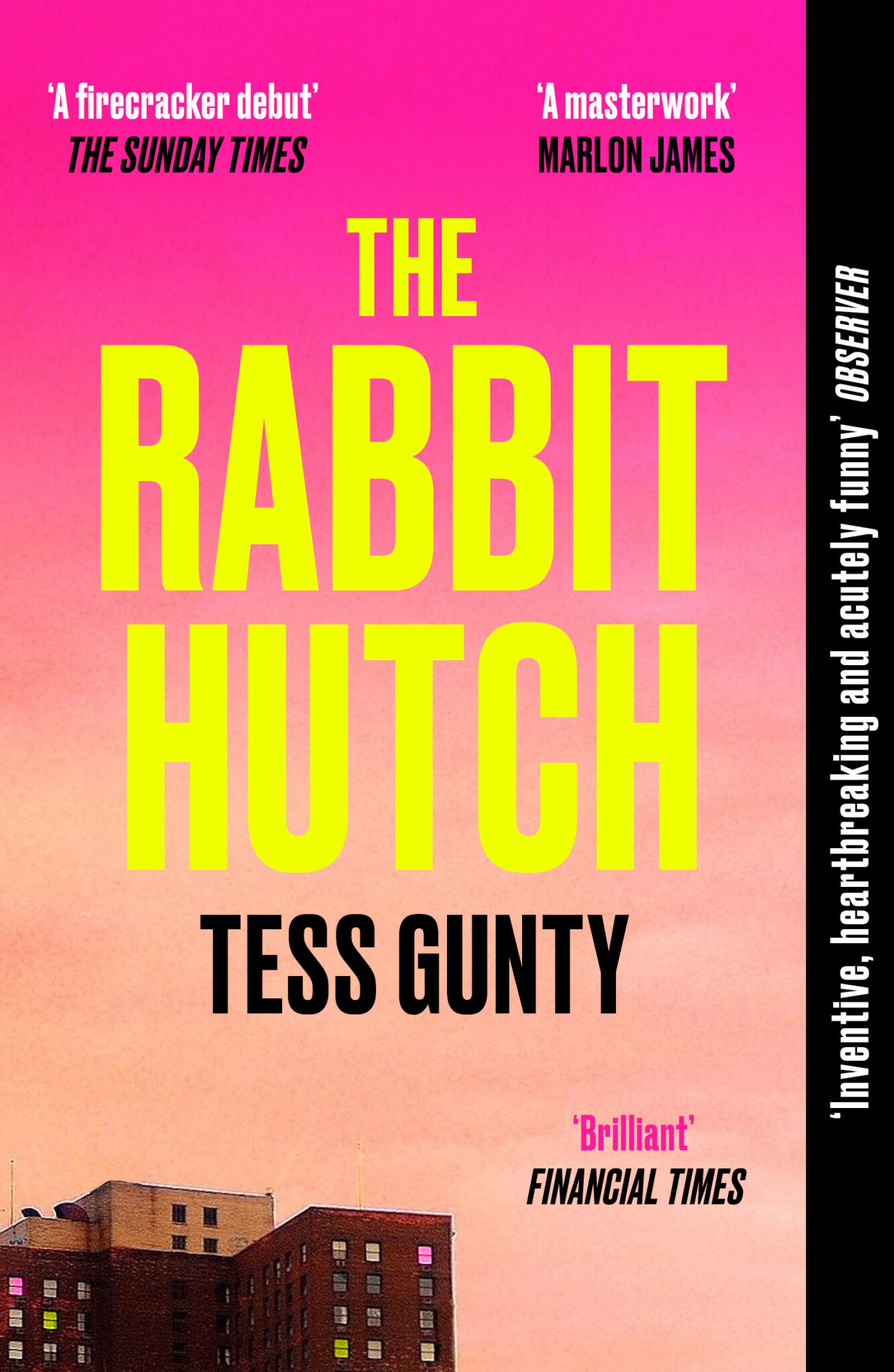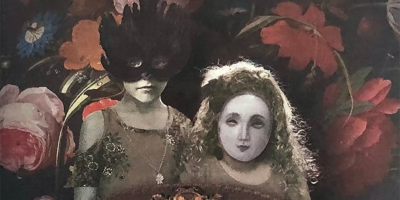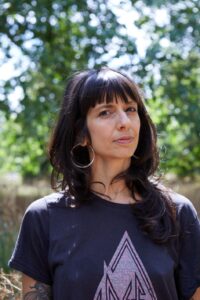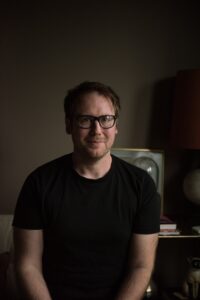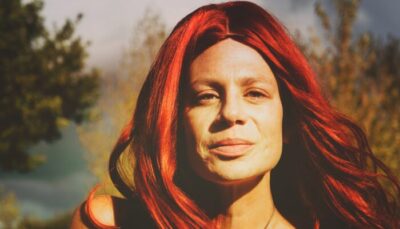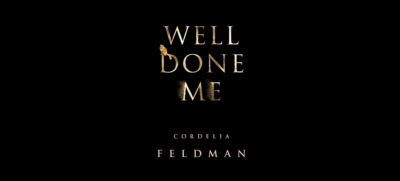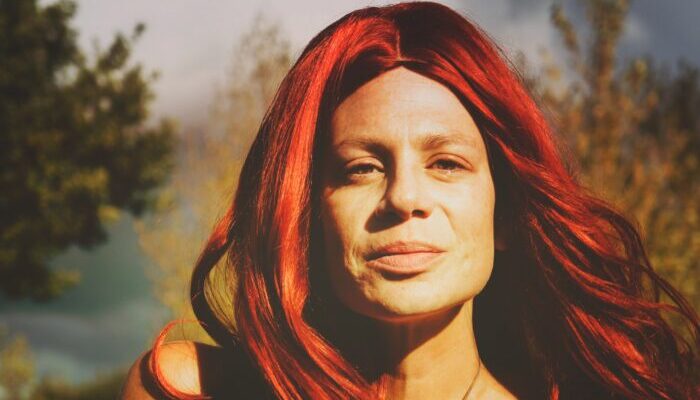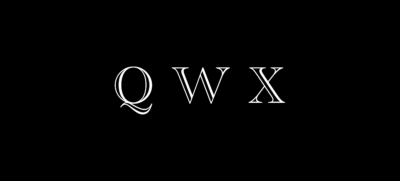– Don’t sing now Kyle, love –
That’s Mrs Turner, she’s old and from Yorkshire, she calls everyone ‘love’ even though Queen Bitch (I can’t say that word but I can think it) Abigail, big sour face, says it infantilises the service users. (That’s me and my friend Emma, and all the other people who live upstairs. They put bars on the windows so they don’t throw themselves out, not because this is a prison, bad people go to prison. I’m not bad, but I think some of the people here might be, like slack-jawed Billy Bloodworth. He can’t keep his mouth closed when he’s eating, and the other day he was throwing his mashed potatoes at everyone. They made a bloody awful mess, splat, all over the windows, and poor old Mrs Turner had to clean it up. But I made Billy stop with my mind.)
Nice Lady Shan is feeding Nathan, who lives across the hall from me. -You like your Thai green curry, don’t you Nathan -. He can’t really move much or say much, our Nathan, but he’s a good lad; if I see a sticker I think he’ll like then I save it for him, even if it’s shiny. They have a tiny crane they use to hoist Nathan in and out of his giant blue chair.
They can only see me if I let them, not like Emma, she doesn’t like to be seen. When I was little, before I moved here, I lived in a big house in the countryside. Something was living in the attic, you could hear it scratching about, but we just ignored it, till one day, my dad was eating bangers and mash, we could hear the thing start charging about, and a big chunk of plasterboard fell into his dinner and he banged his knife and fork down on the table.
– That’s it, I’m going to get that bloody thing, – he got a pillowcase and a cricket bat, – it’s him or me Kyle, – and he went up to the attic. He was banging around for ages; we could hear him. – Come on you little bastard, where are you? – That’s when he went through the ceiling, just his legs trying to walk on air. – My ———Kyle———are–
– Kyle? – someone shaking my shoulder, – Kyle are you alright, love? –
– Yes Mrs Turner. –
-Ok you went right wobbly then-, smiling, her hand still on my shoulder, -Don’t forget you’ve got an appointment with Dr Marshal. –
Yorkshire must be a wonderful place. Mrs Turner’s always saying the best people come from Yorkshire. I wish I came from Yorkshire, I bet life would be good then. I could have a flat with a lift up to it, so Nathan could come and stay, and I could put up whatever posters I want. The corridors here have funny paintings all along the walls, they’re not like pictures of people or anything good, they’re just like squiggly lines and blobs. If I was in art and just did a load of blobs and squiggles, I wouldn’t be able to keep a straight face.
After lunch, we all move back into the activities room. It’s where we go after breakfast, that’s pretty much our day: wake up, breakfast, activities room, then back to the dining hall, lunch, until eventually we go to bed. You feel lucky if you’ve got a hospital appointment, just to break it up a bit (once when I had a hospital appointment Shan took me to a McDonalds, but we can’t let Abigail know, even though I had carrot sticks instead of chips, and I got a turtle toy, but I have to hide it from Abigail, because she’ll know I went to McDonalds if she sees it). I can walk on my own but a lot of the people who live here need help, I’m not very big but when I grow up I could push Nathan. We only have lessons three days a week, the rest of the time Doris reads to us, or Shan does an activity with us, like one time she showed us how to draw a cube. It’s dead easy, even I can do it and I’m awful at drawing. Today we’re going to make masks out of paper plates. You can be a bird or a cat or elephant, I want to be a Pikachu, because when I was very young I wanted to be a Pokémon trainer, I know how silly that sounds, but Billy Bloodworth still thinks he’s going to play for Chelsea, and he’s almost as bad at football as me.
The activities room is big and oblong, the carpets mostly grey but there’s one bit that looks like a city from above, and you can play cars on it. Nathan can’t play cars, because he’s stuck in a chair. No one’s ever told me what’s actually the matter with Nathan, but I don’t think it’s catching. Billy Bloodworth used to make fun of me, saying I’d catch Nathan’s mong, but Shan heard him one day, and told him it didn’t work like that, and that mong was a horrible word, and he should be ashamed of himself for being so rude.
Wendy, who thinks she’s a ghost, is clicking the beads in Nice Lady Shan’s hair like a rosary. I don’t know why Wendy thinks she’s a ghost. The first time I met her she was biting Yannis the giant Greek on the arm. He was trying to pretend it didn’t hurt, but you could tell by the way his voice kept going up and down that it did. – I’m sorry, I’m sorry, little girl if you say you’re a ghost, then you are a ghost please, stop biting me ghost, ahhhh I’m sorry -, and she let go, I expected her to have blood all round her mouth, but she just looked dead pleased with herself.
– Thank you Yannis – she said, – that will be all today, – like she owned the place, which was absolutely hilarious.
Shan turns to face Wendy, – I’m going on my break now, Wendy. – Wendy nods. – I’ll be back soon. – Wendy nods again, just once in a sort of jerky motion.
-Hello Kyle, how are you today? – Abigail looms over me, her face right into mine. All the people who work here do this when they want to talk, but it’s awful when Abigail does it, it’s just awful. Mrs Turner is really funny, she says things like, – I’m too old for this, – or, – They’ll need six strong Irishmen and a winch to get me up from here. – She doesn’t loom over you grinning. That’s one thing I know, you don’t grin, it’s all I can do not to run and hide.
– Hello Mrs Abigail, I’m feeling very well. – That’s a lie, but I need to do good manners, – How are you today? –
– I’m very well thank you Kyle, – she looks like she’s trying to eat her own lip, but I know she’s just thinking what to say next – I see you have an appointment with Dr Marshal. It’s really important, – she puts her hand on my arm, – that you have a good chat and tell him all about Emma, and———Kyle did you get that, are you ok? –
– I think so. –
– Jolly good. Now go make your mask. – Abigail stands up and, as she’s leaving, she stops by Doris, who’s changing the batteries in the telly remote, and real sneaky-like, she starts talking about me.
– Doris, how do you think young Kyle seems? –
Mrs Turner is banging the remote hard against the flat of her hand. – He seems very well to me, have you asked him? Poor lad had one of his funny turns earlier. –
– He did? Why was I not informed? It’s important that all of our service users’ symptoms are documented, so the council gives us a good deal on funding. If he had an accident and could have fallen… – it all comes out fast, like a blur. – You didn’t have to fill an incident form? – Abigail’s face goes all contorted (I learnt that word from Houdini, he was a magician who could do anything, but one day someone punched him when he wasn’t expecting it and he died) and her nostrils go all wide, like she’s about to charge.
– Well no, he didn’t have an accident, he just went a bit wobbly. – Mrs Turner rubs the back of her neck.
– And then what? –
– He was alright, I think. –
– He could have fallen over though, is what you’re saying? –
– Maybe. I don’t –
– I might be able to wrangle more funding, so Kyle can have a one-to-one carer. An extra staff on the floor would make life easier. –
– Oh, he doesn’t need that. It seems dishonest, asking for something that he might not need. –
– You leave it to me. – Abigail turns on her heel, but then stops and turns, – By the way, where’s Shan? –
– Just having her tea break –
A- Oh, well make sure she only has fifteen minutes. –
Finally she leaves. Mrs Turner mutters something and gives the remote one last whack and the batteries come flying out and go skidding under the table. – Oh, marmalade! –
– I can get those for you, – I say.
– Good lad, if I went under there I wouldn’t be getting out in a hurry- she giggles but I can tell she’s thinking about how much she’d like to slap Abigail. The table next to the telly’s big, and going underneath it feels a bit like going to another world. It’s dark, I keep thinking of The Lion the Witch and the Wardrobe. I know I’m not going to Narnia but it’s fun to pretend.
– Have you found them Kyle? –
– Yes, Mrs Turner I’ve got them. – I shuffle backwards, out from under the table, clutching the dead batteries. Mrs Turner must have put the new batteries in, because the telly’s on and she’s flipping through the channels.
This is the only thing Shan and Mrs Turner argue about, because Mrs Turner likes to watch Jeremy Kyle, who I don’t mind so much because he has the same name as me, and I like to imagine what it would be like if I had my own telly program. Hello and welcome to the Kyle show, we’ve got a load of entertainment for you tonight, along with my co-host, Nathan, we’ll be bringing you hit music, and zany guests. Instead of interviewing famous people, I’d only interview normal people like Mrs Turner. You know the bit where they’re doing the whole, so Mr Z you’ve sold loads of records, how did you ever manage that? I’d say things like: Mrs Turner, you were out of bed at half past six this morning, so you could get to a job where you spend all day helping other people, and I’d put on the applause sign. I think it would be the best show on TV.
– Good lad Kyle, I’ll put them in the recycling. –
– It’s important to recycle! This is the only planet we’ve got. –
– That’s right –
– If we didn’t recycle then… –
– I know Kyle. Why don’t you get back to your cars? –
Recycling is one of my obsessions, I can’t help it, I just think about how it just makes sense and I get really cross, that some people don’t do it just because they can’t be bothered. Like my nan, she never recycled, I remember when I was small I went to live at her house for a little bit. She lived on the Burlington Estate somewhere in a place called South Staffordshire. The people sounded even stranger than Doris, I could hardly understand a word anyone said when I first got there, Yowalright, was a new word I learnt, it meant hello how are you? But it was all just one word, which I thought was really clever. If you say it to someone who’s never heard it before though, they give you a right funny look.
It was nice at my nan’s house though, there were a load of places to go, like the Sea Life Centre, that was dead interesting, they had fish there that all started off life as a girl, but they turn into boys if they want to. They had a big underwater tunnel, it was like something from the future, and the shark swam right over us. They have sea anemones too, that you can touch. I wanted to be a marine biologist for a while then but I can’t swim, I don’t think they’d let Nathan go out to sea, and I wouldn’t like to not see him for months on end.
I can’t remember why I went to live at my nans, it was just after dad had fallen through the ceiling. Maybe the thing in the attic got out, and he was worried it might bite me and I’d have to get a series of subcutaneous injections (I can’t remember where I learnt that word, but it’s a good one) or I might go septic like mo.
———slap———I———I’m on the floor, and someone is kicking me.
-You shouldn’t laugh at ghosts, – Wendy kicks me, and it really hurts, – I am a ghost – she screams, Nice Lady Shan scoops her up, but Wendy’s legs keep kicking at me. I roll away, my head all bloody. I lose track of where everybody is, and when I try to sit up I feel woozy and sick so I roll the other way onto my side, and I can see Shan telling Wendy off, but I can’t really hear, the only sound I can make out is a sort of whooshing sound, like when you put a shell up to your ear and you can hear the sea. It’s hard to concentrate, so I can’t get Wendy to calm down with my mind. The mask making things are all over the floor, I think I might have bled on some of them a bit.
Mrs Turner comes around the corner, she must have gone on break because she has her phone out and is smiling at whatever is on the screen (Mrs Abigail has a fit if anyone goes on their phone when there working, but she can’t stop them when there on break). She looks up, notices where I am, and her hand flies up to her mouth.
– Jesus, what happened here? –
I try to answer her, but my mouth’s all dry, and before I can, Shan interrupts.
– She just started knocking the shit out of him. –
– God, Kyle, are you ok? Shan go fetch the nurse. –
That’s one of the things that annoys me about this place. We have three floors filled with all different types of people, with different things wrong with them, but only one nurse. What if two people get hurt at the same time? No good, very bad indeed.
– Can you sit up Kyle, love? What happened? –
– I’m ok. I don’t know, really.
Wendy’s pacing the other side of the room, staring daggers at me, – HE DOES KNOW – she screams.
– CALM DOWN – Mrs Turner shouts, but only to Wendy’s back as she stomps her way down the corridor.
I try to stand up, but my legs and tummy don’t feel very good. I think that I might be sick, but nothing happens. They don’t tell you about this in films; you see a load of violence, people shooting and stabbing each other, and maybe they die or lose an arm or a leg, but you don’t see how it makes someone feel. The sick to your stomach, desperate for it to stop, taste the other person’s anger feeling. You might think you deserve it, but you just want it to stop. You see all these superheroes who can shoot lasers out their eyes, or have superhuman strength, but that’s nothing, they can’t really make the world a better place, they just make more fighting happen. That’s why my favourite superhero is Molecule Man, he has the power to alter anything he wants on a molecular level, so if someone wants to fight him he can just go, no, boom you’re a marshmallow. I’d trade in being able to make people stop with my mind, if I could have molecule man’s powers, because he can change anything, cure illness and stop world hunger. I’ll just turn sand molecules into tasty banana bread, that’s what I’d do.
Shan comes rushing in with Nurse Kath, she’s everyone’s favourite. She comes from somewhere called the Czech Republic, and her name isn’t really Kath, it’s something completely mad and unpronounceable.
– Good morning Mr Kyle, now don’t tell me you have been fighting? – The way she’s smiling I know it’s a joke. – Now let me take a look at this booboo. – I can feel her scrutinising my wound. – Kyle, – her voice goes serious, – I believe you will live, but you have taken a nasty blow to the head, you are going to need to stay awake, just to be on the safe side, you know to make sure you don’t have a concussion. –
I like the way Kath talks to me, like I’m actually there.
– You say he fell, did he? – Abigail stands over us now, with her hands on her hips, looking right happy with herself, like the cat that got the cream, as my nan always used to say. – That’s really good, now I can definitely get some more funding from the council. –
– Where’s Wendy gone? – Shan asks, and that’s when we hear the screams. Billy comes staggering in, all caked in something, I can’t figure out what, I can see something sticking out of his head, it’s all white. I think it might be his skull.
And then———
When Emma met Dr Marshal.
Good afternoon he says, spends forever in his notes.
Scribble, scrabble, dibble, dabble, won’t you hurry up. Better things,
to do with my time, no golf on the weekends for me. you can keep that,
ratty Mrs of yours mind, that’s her photograph isn’t it,
nothing to be proud of.
If you want to know which one of us you’re talking to, just ask.
Oh, no he didn’t deal with that very well, he blames himself, see.
Thought he switched her off? It don’t make any sense.
She was in pain, you Muppet.
Who am I? That’s a bit bloody rude, I know who you are, you’re a bloody sphincter.
I tell him stories, once upon a time and all that, shall I tell you a story. Once upon a time, in the land of no place else, there lived a doctor, horrible ugly little man, terrible erectile dysfunction, awful, couldn’t satisfy his wife, and what’s more he had the worst dandruff. One day a boy arrives in his office, he’s all types of mental: no mom, his dad is entirely useless. . The ugly little doctor tries his best, but it’s not good enough, day after day, despite his best efforts, the boy’s still a mental.
Does any of this sound familiar?
I’m his best friend you doughnut, apart from maybe that Nathan, maybe, I don’t know. Should have drowned him at birth.
That bloody ghost got an attitude an all.
Don’t you take that tone with me, do you even know who I am?
———and then my hands are hitting something. I don’t know where I am, but I’m hitting something. It catches me by the wrists, and I realise it’s Dr Marshal. – Hush now, you’re okay, – he says. The door opens, and in steps Kath’s son, Pavel.
– All ok? I heard the buzzer. –
-Yes, we’re fine Pav mate, Kyle just had a bit of an episode. Better safe than sorry. –
– No sweat. – He makes his voice go more upbeat like, – How is little Kyle feeling today, it is Kyle? – Dr Marshal nods. – You want to watch football tonight? Man-U are playing. – Pavel loves football, and because Manchester United are his team, and I’ve been to Manchester once, that makes us friends, I think that’s how it works. I like watching football, and trying to switch people off. It’s the only way to get through it really, it just goes on and on, and then there might be extra time.
– I think this is a good point to end this session, – says Dr Marshall.
– Is it nearly dinner time? – I ask.
– Yes Kyle, we will go straight to the dining room, – says Pavel, ushering me out.
– Goodbye Dr Marshal, – I shout back over my shoulder.
– Bye Kyle. –
Today’s been a really confusing day, I don’t quite know what to make of it all.
Billy Bloodworth’s not dead, which is a little bit disappointing. (That was nasty but I don’t mean it). I asked Shan what had happened. When we were having supper, I walked in and Billy was just there eating pasta.
– Oh that, no Billy wasn’t hurt, – giggling to herself, – Billy had got into the kitchen, someone left the door unlocked, and he stole a tub of ice cream. He must have bumped into Wendy after she stormed off, and the tub ended up on poor Billy’s head. –
So, Billy’s alive and well. Which isn’t really a bad thing, he and I don’t always get on but I think it’s good to have a rival. Where would Batman be without the Joker? He’d spend all day sat in the bat cave, more tea Alfred, it doesn’t look like they’ll be any good crime today, all glum and depressed. It’s funny though I could have sworn Billy had his head bashed in, absolutely sworn blind that’s what I’d seen. I suppose a lot of the time people just sort of trick themselves into seeing things.
Apparently, I went to see Dr Marshal, but I don’t remember that. The last thing I remember is seeing Billy. I get woozy when I see blood, even when it’s actually ice cream. I don’t know why, my Nan was the same, – If I want to see two idiots knock each other’s teeth out, I’d go stand outside the Dog and Duck on a Saturday, that’s what she used to say.
I can hear Nathan being put to bed, it takes two people to get Nathan in and out of bed, or if he wants to go to the lavatory. I don’t really need that kind of help (lavatory is a much better word than Bog). If I had loads of money, I’d leave here, just me and Nathan, we could buy a flat in Yorkshire, and I could get a job at the cricket ground, not for the money but just to stay busy. Me and Nathan could go out whenever we wanted to get a takeaway curry. But I’m stuck here. I can’t really complain, there are folks in worse places than this. Mrs Turner told me about a place she worked at years ago, where they electrocuted people’s brains. I don’t know what they expected it to do, except for making their hair stand up on end. This is the only time of day I get much of a chance to be lonely. Sometimes I get visitors, but not many recently. This is the only time of day I get much of a chance to be lonely, sometimes I get visitors, but not many recently.
This always happens right before I go to sleep, I start thinking about my life and get all maudlin (my nan’s favourite word). I can’t remember big chunks of things that have happened to me, and no one will explain it to me. Maybe they might have and I’ve just forgotten. I can keep hoping that maybe one day I’ll wake up and I’m not me anymore, that instead I’m someone who can do things and who isn’t laughed at when they say they want to be a marine biologist. Maybe I’ll wake up in Yorkshire, the best people come from Yorkshire.
